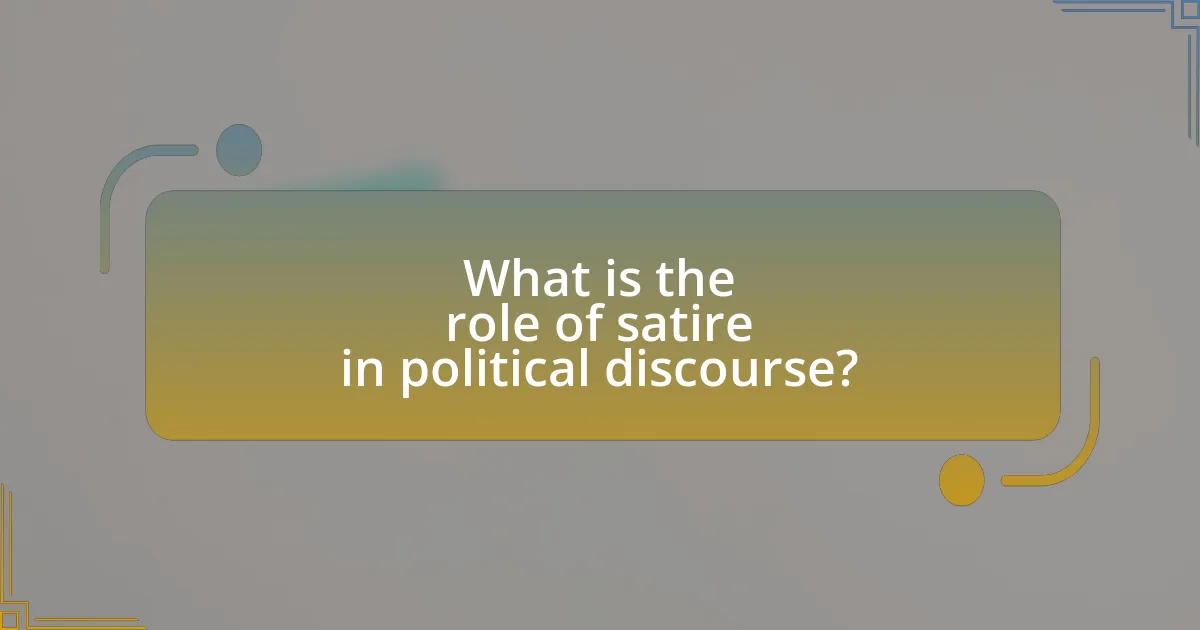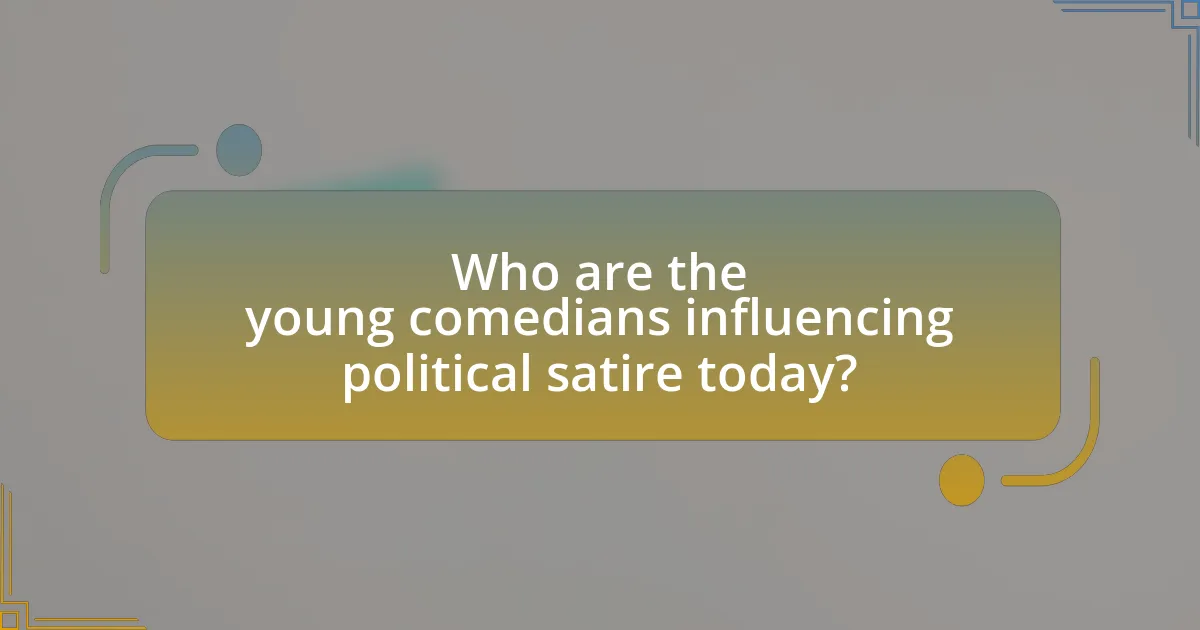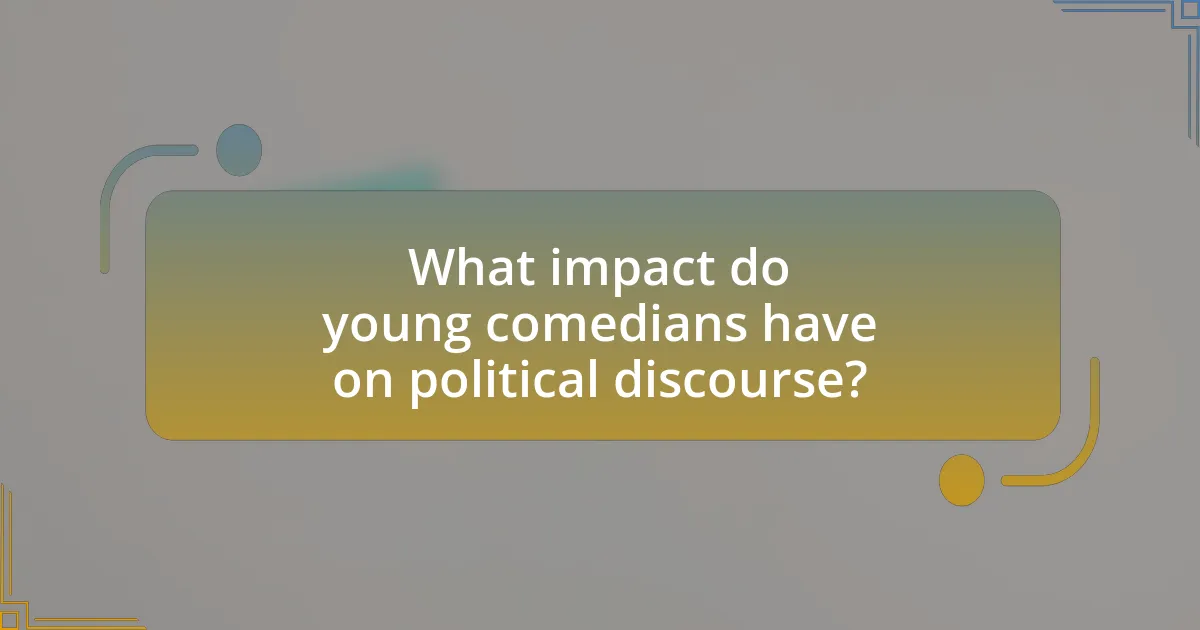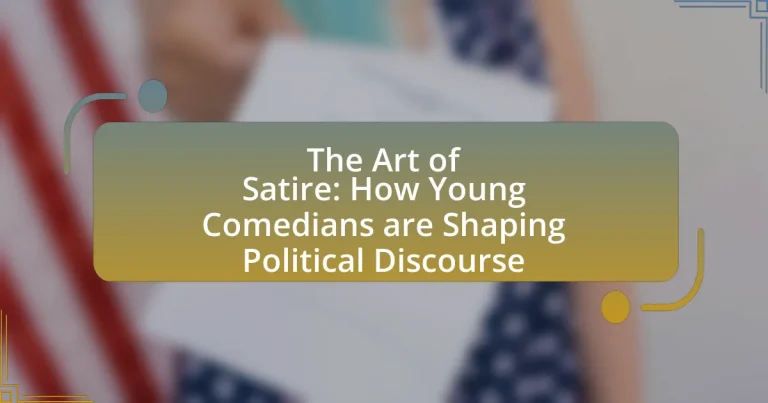The article examines the significant role of satire in political discourse, particularly focusing on how young comedians are reshaping this landscape. It explores the evolution of satire from traditional forms to modern digital platforms, highlighting its effectiveness in engaging younger audiences and influencing public opinion. Key examples of historical and contemporary satirical works illustrate the impact of humor on political commentary, while discussions on cultural perceptions of satire reveal its diverse applications across different societies. The article also addresses the challenges faced by young comedians in navigating censorship and backlash, emphasizing strategies for effective engagement with political issues.

What is the role of satire in political discourse?
Satire plays a crucial role in political discourse by providing a means to critique and challenge political figures and policies through humor and exaggeration. This form of expression allows comedians and satirists to highlight societal issues, provoke thought, and encourage public engagement in political matters. For instance, programs like “Saturday Night Live” and “The Daily Show” have historically influenced public opinion and voter behavior by using satire to address current events and political controversies, thereby making complex issues more accessible and relatable to a broader audience.
How has satire evolved in the context of political commentary?
Satire has evolved significantly in the context of political commentary, transitioning from traditional forms like print and theater to modern platforms such as television and social media. Historically, satire served as a tool for social critique, exemplified by figures like Jonathan Swift and Mark Twain, who used humor to address political issues. In contemporary settings, young comedians leverage digital platforms to reach wider audiences, utilizing memes, podcasts, and streaming services to engage with political discourse. This shift has democratized satire, allowing diverse voices to participate in political commentary, as seen in the rise of shows like “Last Week Tonight with John Oliver” and “The Daily Show,” which blend humor with investigative journalism. The accessibility of social media further amplifies this evolution, enabling rapid dissemination of satirical content that can influence public opinion and mobilize political action.
What historical examples illustrate the impact of satire on politics?
Historical examples illustrating the impact of satire on politics include Jonathan Swift’s “A Modest Proposal,” which criticized British policy towards the Irish in the 18th century, and the satirical cartoons of Thomas Nast, which played a significant role in exposing corruption in Tammany Hall during the 19th century. Swift’s work used irony to highlight the dire situation in Ireland, effectively influencing public opinion and policy discussions. Similarly, Nast’s illustrations not only entertained but also mobilized public sentiment against political corruption, leading to reforms. These instances demonstrate how satire can provoke thought, inspire action, and shape political landscapes.
How do different cultures perceive and utilize satire in politics?
Different cultures perceive and utilize satire in politics in varied ways, often reflecting their unique social, historical, and political contexts. For instance, in the United States, satire is commonly employed as a tool for social critique, with programs like “Saturday Night Live” and “The Daily Show” using humor to address political issues and influence public opinion. In contrast, countries with stricter censorship, such as China, utilize satire more cautiously, often embedding it within allegorical narratives to circumvent government restrictions while still critiquing political figures. Furthermore, in countries like France, satire is deeply ingrained in the cultural fabric, exemplified by the long-standing tradition of political cartoons and publications like “Charlie Hebdo,” which boldly challenge political norms and provoke public discourse. These cultural differences highlight how satire serves not only as entertainment but also as a significant mechanism for political engagement and social commentary across various societies.
Why is satire particularly effective in shaping public opinion?
Satire is particularly effective in shaping public opinion because it combines humor with critical commentary, making complex social and political issues more accessible and engaging. This approach allows audiences to reflect on serious topics while being entertained, which can lead to increased awareness and discussion. Research indicates that satirical content often resonates more with younger demographics, as seen in studies by the Pew Research Center, which found that younger audiences are more likely to consume news through satirical platforms, thereby influencing their perceptions and opinions on political matters.
What psychological mechanisms make satire resonate with audiences?
Satire resonates with audiences primarily through mechanisms such as cognitive dissonance, social identity, and humor appreciation. Cognitive dissonance occurs when satire highlights contradictions in societal norms or political behavior, prompting audiences to reassess their beliefs. Social identity theory suggests that individuals relate to satirical content that reflects their group values, enhancing their sense of belonging. Additionally, humor appreciation allows audiences to engage with serious topics in a more palatable way, facilitating critical thinking while reducing defensiveness. Research indicates that satirical content can effectively influence public opinion by making complex issues more accessible and relatable, as seen in studies like “The Effects of Political Satire on Public Opinion” by Hollander and Karpowitz, which demonstrates how satire can shift perceptions and encourage political engagement.
How does satire challenge traditional media narratives?
Satire challenges traditional media narratives by using humor and exaggeration to critique societal issues and political events. This form of expression often highlights inconsistencies, biases, and absurdities in mainstream reporting, prompting audiences to question the validity of the information presented. For instance, programs like “The Daily Show” and “Saturday Night Live” have effectively used satire to expose the shortcomings of news coverage, influencing public perception and encouraging critical thinking about political discourse. By presenting alternative viewpoints and mocking established narratives, satire fosters a more engaged and informed audience.

Who are the young comedians influencing political satire today?
Young comedians influencing political satire today include John Mulaney, Hasan Minhaj, and Samantha Bee. John Mulaney is known for his sharp observational humor and has gained prominence through his Netflix specials and work on “Saturday Night Live.” Hasan Minhaj, through his Netflix show “Patriot Act,” has tackled complex political issues with a blend of humor and personal storytelling, earning critical acclaim. Samantha Bee, as the host of “Full Frontal with Samantha Bee,” has been a vocal critic of political figures and policies, using satire to address social issues. These comedians are reshaping political discourse by engaging younger audiences and addressing contemporary issues through humor.
What characteristics define the new generation of political comedians?
The new generation of political comedians is characterized by their use of digital platforms, a focus on social justice issues, and a blend of humor with activism. These comedians leverage social media to reach wider audiences, often creating content that resonates with younger demographics. Their material frequently addresses systemic inequalities, climate change, and political corruption, reflecting a commitment to social change. For instance, comedians like John Oliver and Hasan Minhaj utilize their platforms to educate viewers on complex political topics while maintaining an entertaining approach, demonstrating the effectiveness of humor in political discourse.
How do their backgrounds and experiences shape their comedic styles?
Comedians’ backgrounds and experiences significantly shape their comedic styles by influencing their perspectives, themes, and delivery methods. For instance, comedians from diverse cultural backgrounds often incorporate their unique life experiences into their routines, allowing them to address social issues and cultural nuances that resonate with specific audiences. This is evident in the work of comedians like Hasan Minhaj, whose Indian-American heritage informs his storytelling and commentary on race and identity, making his humor both relatable and thought-provoking. Additionally, personal experiences, such as overcoming adversity or navigating societal challenges, can lead comedians to develop a distinctive voice that reflects their journey, as seen in the comedy of Tiffany Haddish, who draws on her experiences with poverty and resilience. These elements combine to create a comedic style that is not only entertaining but also reflective of the comedians’ identities and the societal contexts they engage with.
What platforms do these comedians use to reach their audiences?
Comedians use social media platforms, streaming services, and live performances to reach their audiences. Social media platforms like Instagram, Twitter, and TikTok allow comedians to share short clips and engage directly with fans, while streaming services such as Netflix and Hulu provide a broader platform for longer specials. Live performances at comedy clubs and festivals enable comedians to connect with audiences in real-time, enhancing their reach and impact. These methods are effective as they leverage the digital landscape and traditional venues to maximize audience engagement and visibility.
How do young comedians address contemporary political issues?
Young comedians address contemporary political issues through satire, using humor to critique and highlight societal problems. They often focus on current events, social justice, and political figures, employing relatable anecdotes and sharp wit to engage audiences. For instance, comedians like John Mulaney and Hasan Minhaj have tackled topics such as immigration and healthcare, making complex issues accessible and sparking conversations. Their performances often reflect the sentiments of younger generations, resonating with audiences who seek both entertainment and commentary on pressing political matters.
What themes are most commonly explored in their satire?
Young comedians commonly explore themes of political hypocrisy, social injustice, and cultural norms in their satire. Political hypocrisy is often highlighted through exaggerated portrayals of politicians and their contradictory actions, revealing the gap between their promises and reality. Social injustice is addressed by critiquing systemic issues such as racism, inequality, and discrimination, using humor to provoke thought and encourage dialogue. Cultural norms are examined by challenging societal expectations and stereotypes, often through relatable anecdotes and observations. These themes resonate with audiences, making satire a powerful tool for commentary and reflection on contemporary issues.
How do they balance humor with serious political commentary?
Young comedians balance humor with serious political commentary by using satire to highlight societal issues while engaging audiences. They employ comedic techniques, such as exaggeration and irony, to make complex political topics more accessible and relatable. For instance, shows like “Last Week Tonight with John Oliver” effectively combine humor with in-depth analysis, allowing viewers to grasp critical issues while being entertained. This approach not only fosters awareness but also encourages dialogue, as evidenced by increased public engagement in political discussions following comedic segments.

What impact do young comedians have on political discourse?
Young comedians significantly influence political discourse by using satire to engage younger audiences and challenge established narratives. Their unique perspectives often highlight social issues, making complex political topics more accessible and relatable. For instance, comedians like John Mulaney and Hasan Minhaj have effectively addressed topics such as immigration and healthcare, prompting discussions among their followers. Research indicates that humor can enhance political engagement, as seen in studies showing that satirical content increases awareness and interest in political issues among younger demographics. This impact is evident in the rise of platforms like social media, where young comedians can reach vast audiences quickly, shaping public opinion and encouraging civic participation.
How do they engage younger audiences in political discussions?
Young comedians engage younger audiences in political discussions through humor and relatable content. By using satire, they simplify complex political issues, making them more accessible and entertaining for a younger demographic. For instance, platforms like social media allow comedians to reach vast audiences quickly, with shows like “Saturday Night Live” and online sketches addressing current events in a humorous light. This approach not only captures attention but also encourages critical thinking about political topics, as evidenced by studies showing that humor can increase political engagement among younger viewers.
What strategies do they use to make politics accessible and relatable?
Young comedians use humor, storytelling, and relatable anecdotes to make politics accessible and relatable. By employing satire, they simplify complex political issues, allowing audiences to engage with topics that might otherwise seem daunting. For instance, shows like “Last Week Tonight with John Oliver” break down intricate policies into digestible segments, often using visual aids and comedic sketches to illustrate their points. This approach not only entertains but also educates viewers, fostering a deeper understanding of political matters. Research indicates that humor can enhance retention of information, making it a powerful tool for political engagement.
How do their comedic approaches differ from traditional political commentary?
Young comedians differ from traditional political commentary by employing satire that is more irreverent and personal, often focusing on relatable experiences rather than solely on political figures or events. This approach allows them to connect with audiences on an emotional level, making complex political issues more accessible and engaging. For instance, comedians like John Mulaney and Hasan Minhaj use storytelling and personal anecdotes to highlight societal issues, contrasting with traditional commentary that often relies on formal analysis or direct criticism of politicians. This shift reflects a broader trend where humor serves as a vehicle for social critique, making political discourse more inclusive and reflective of diverse perspectives.
What challenges do young comedians face in political satire?
Young comedians face significant challenges in political satire, primarily due to the polarized political climate and the risk of backlash. The current environment often leads to heightened sensitivity around political topics, making it difficult for emerging comedians to navigate humor without offending audiences or facing social media backlash. Additionally, young comedians may struggle with limited platforms and opportunities to showcase their work, as established comedians often dominate the space. According to a 2021 study by the Pew Research Center, 70% of Americans believe that political correctness has made it harder for comedians to be funny, highlighting the constraints young comedians encounter in their craft.
How do they navigate censorship and backlash from various audiences?
Young comedians navigate censorship and backlash from various audiences by employing strategic humor and self-awareness. They often tailor their content to resonate with specific demographics while being mindful of sensitive topics, which helps mitigate potential backlash. For instance, comedians like Hasan Minhaj and John Mulaney address controversial issues through relatable storytelling and satire, allowing them to critique societal norms without alienating their audience. This approach is supported by the fact that comedians frequently analyze audience reactions and adapt their material accordingly, demonstrating an understanding of the cultural landscape and the boundaries of acceptable discourse.
What role does social media play in amplifying or hindering their messages?
Social media amplifies the messages of young comedians by providing a platform for rapid dissemination and engagement, allowing their satirical content to reach a wider audience. For instance, platforms like Twitter and Instagram enable comedians to share short, impactful clips or jokes that can go viral, significantly increasing their visibility and influence in political discourse. According to a study by the Pew Research Center, 69% of adults in the U.S. use social media, which highlights the potential reach these comedians have to engage with diverse demographics. Conversely, social media can hinder their messages through the spread of misinformation or negative backlash, as seen when satirical content is misinterpreted or taken out of context, leading to public misunderstanding or criticism.
What can aspiring comedians learn from the current landscape of political satire?
Aspiring comedians can learn the importance of timing and relevance from the current landscape of political satire. The effectiveness of political satire hinges on the ability to address contemporary issues while engaging audiences through humor. For instance, shows like “Saturday Night Live” and “The Daily Show” have successfully capitalized on real-time political events, demonstrating that timely commentary resonates more with viewers. Additionally, the rise of social media platforms allows comedians to quickly share their satirical takes, amplifying their reach and impact. This dynamic environment emphasizes the need for comedians to stay informed and adaptable, ensuring their material remains pertinent and engaging.
What best practices should they follow to effectively engage audiences?
To effectively engage audiences, young comedians should prioritize authenticity, relatability, and timely content. Authenticity fosters trust, as audiences connect more with genuine voices; for instance, comedians like John Mulaney and Hasan Minhaj have built strong followings by sharing personal stories that resonate with their viewers. Relatability ensures that the humor reflects the audience’s experiences and societal issues, which can be seen in the success of comedians who tackle current events and cultural phenomena. Timely content, especially in political satire, captures audience attention and encourages sharing, as evidenced by the viral success of sketches addressing recent political events. By combining these elements, young comedians can create impactful performances that resonate deeply with their audiences.
How can they develop their unique voice while addressing political issues?
Young comedians can develop their unique voice while addressing political issues by blending personal experiences with sharp observational humor. This approach allows them to connect authentically with their audience, making complex political topics more relatable. For instance, comedians like John Oliver and Hasan Minhaj have successfully used their cultural backgrounds and personal narratives to frame political commentary, which resonates with diverse audiences. By incorporating specific anecdotes and perspectives, they not only highlight societal issues but also establish a distinctive comedic style that sets them apart in the political discourse landscape.


